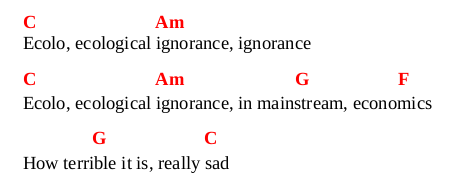
As I was studying conventional economics at the University of Zurich (2002-2004), I became more and more suspicious of the stuff that we were learning in the name of objective social science. A series of questions began to appear in my mind, such as:
If nature is the primary re-producer, that is, not only a passive raw material resource and a passive dumping ground for waste, why didn’t we learn first of all ecology, which is the economy of nature? After all, the word “economy” (oikos+nomia) shares the same linguistic root with “ecology (oikos+logia). “Oikos” means household in Greek.
I already had a master degree in electrical engineering as I began to study economics. In the department of electrical engineering, we learned first physics (i.e. Newton physics, mechanics, electromagnetics, linear & nonlinear dynamic systems etc.) before learning core theories of electrical engineering like telecommunication because physics was rightfully supposed to be an elementary field for further studies.
How is it possible that an economics student doesn’t need to study ecology and anthropology (i.e. evolutionary human ecology & culture) before learning the core theories of economics?
Imagine a biologist who was not required to learn the modern synthesis of the Darwinian evolutionary theory. Without evolution, you can’t explain anything in biology. Similarly, without ecology, you can’t understand economy in its completeness, especially related with sustainability.
Ecological breakdown, climate crisis, big droughts, big migrations… We are not living in an era of “business as usual”. Consequently, it is no more “business as usual” for the whole education system either; general school and economics education must be redefined; ecological and philosophical literacy must be a top priority.
Furthermore, musical literacy as well as other fine arts must be an integral part of education programs as they enrich the mind and improve the ability for holistic and critical thinking. The ability to see the complete picture in economy, that is, global, complete and long-term view from the historical past to future, has become vital in order to understand the preconditions of sustainable human life on our planet.
Unfortunately, there are still too many prominent environmental economists promoted as “respectable scientists”, who tend to consider GDP (Gross Domestic Product) as the ultimate measure, and GDP growth –which is misleadingly called “economic growth” ignoring the nonmonetary production of nature and society—as the ultimate goal, as if there could be a human economy without human life. As if GDP growth could solve every social and ecological problem of a society. On the contrary; GDP growth obsession and addiction were in fact the cause of many social and environmental disasters in many countries of the world, along with increasing poverty and malnutrition.
My PhD work, which is the core body this book, was an inquiry into the historical roots and causes of this ecological ignorance in mainstream (neoclassical, neoliberal) economics. Understanding these roots & causes is important to surmount the mental and institutional barriers to ecological thinking that is required to initiate the radical social transformation for sustainable and equitable human life on the planet.
Continue reading



